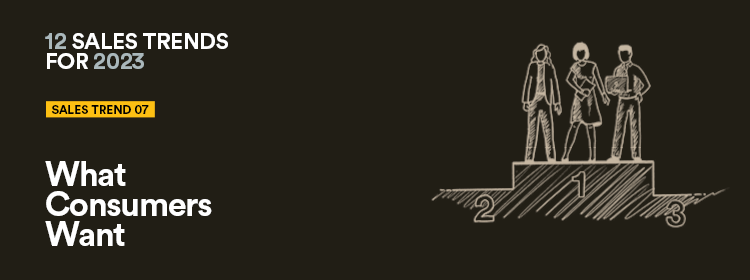
In 30 seconds
Consumers now demand transparency from businesses. They want -and have the right- to know how and where their products were made, the environmental impact, how the business treats their employees, and how much tax they pay. B2C and B2B clients also expect omni buying channels with access to a human when they need or want to. With the increase in online transactions and businesses storing more of our data and behaviours, the risk of data breaches is growing, clients want to know how their data is used and protected. Transparency can be the great equaliser. Consumers –B2C and B2B- are clearly saying how and what they want to buy. It pays to listen to and engage with people, customers, and communities at the human-to-human level.
In 2 minutes
There’s no denying that the pandemic brought about drastic changes in the way we buy. Lockdowns forced people who had never bought online to try out, restricted driving and walking areas helped us discover neighbourhood shops, and the lack of international shipping made us aware of local options that were better for the environment, among other shifts.
These changes shifted the way we buy and what we expect from brands. Let’s look at some of the key issues and trends:
Trust
75% of consumers tried new shopping behaviours, with many of them citing convenience and value. Fully 39 per cent of them, mainly Gen Z and millennials, deserted trusted brands for new ones. That restlessness is reflected in the fact that many younger consumers say that they are still searching for brands that reflect their values.[1] The Edelman Report 2021 shows that 63% of people want brands to make the world a better place, with 61% of the people surveyed saying that they trust businesses more than Governments, NGOs, and Media, and 83% expecting CEOs to speak up on societal issues.
Research by Shopify also found that in e-commerce trust plays a crucial role here. “Brands must be transparent, authentic, and readily available” where customers are prepared to buy, and that means social media.[2]
The omnichannel
New research[3] from Monash University has found traditional bricks and mortar retail stores have surged in popularity post-pandemic, with Australians preferring to shop in-store across most product categories including apparel, personal care, and household goods.
People had been longing for the in-person experience and have been flocking to stores, with in-store traffic back to pre-pandemic levels.[4]
However, whereas before the pandemic there was a clear divide between those who preferred brick-and-mortar and those who preferred online shopping, that’s not the case anymore.
“During COVID-19, online became the main non-grocery retail channel out of necessity and the majority of Australian shoppers turned to online methods, a trend which was accelerated by the pandemic. We’re now seeing the return of a preference for physical stores and shoppers are moving between the offline and online worlds more seamlessly than ever before”.
The annual Retail Monitor from the Australian Consumer and Retail Studies (ACRS) in the Monash Business School found:
- Online shopping rates more favourably in key attributes – product availability, product ranges and sales and promotions.
- 66 per cent of shoppers have returned an item they bought in-store whereas only 42 per cent returned an item they bought online
- Over a third of Australian shoppers (72 per cent) have returned an item they purchased from either physical or online stores.
B2B
There is also an emerging B2B trend with business clients looking for the ability to purchase products and/or services online via purpose-built portals in their one time supplemented with effective human interactions with B2B sales and service people who can work virtually and/or in person with them on more complex buying decisions and service requirements.
Transparency and Data Privacy
With the increase in online transactions and businesses storing more and more of our data and behaviours, the risks of data breaches are growing. Clients want to know how their data is used and protected.
Consumers now demand transparency from businesses. They want -and have the right- to know how and where their products were made, the environmental impact that they have, how the business treats their employees, and how much taxes they pay.
For small businesses, Transparency is the great equaliser. While bigger businesses might struggle to track supply chains, work with only local suppliers, etc. small businesses can manage all of that more easily and communicate it to their buyers.
Support for local and socially conscious businesses
From supplier panels preferring local businesses to everyday consumers choosing their community stores, the support for local businesses that skyrocketed during the pandemic is a welcome trend.
The rise in awareness of the climate crisis also played a big role in this point. Consumers want to support businesses that are proactively doing something about their impact on the environment.
Humans at the Centre
Customers expect to deal with a human when they need or want to. They want to pick up the phone or go into a store and talk to a person. This applies to B2C and B2B.
Consumers are clearly saying how and what they want to buy. It pays to listen to and engage with people, customers, and communities.
Remember, everybody lives by selling something.
[1] https://www.mckinsey.com/capabilities/growth-marketing-and-sales/our-insights/emerging-consumer-trends-in-a-post-covid-19-world
[2] https://www.shopify.com/research/future-of-commerce/future-of-ecommerce
[3] https://www.monash.edu/news/articles/bricks-and-mortar-shopping-makes-a-fashionable-comeback
[4] https://www.monash.edu/news/articles/bricks-and-mortar-shopping-makes-a-fashionable-comeback
Related topics
12 Sales Trends for 2023 – Humans at the Centre
Testimonial
The Audit & Risk Team of ASX listed company: ‘We’ve come to the conclusion that many of our reports and presentations are, in fact, sales pitches for better ways of operating.’
A year ago
Short-termism or Sustainable Business Growth for the new FY
Three years ago
Sales Systems: the secret to sustainable sales success


New Article Email Notification